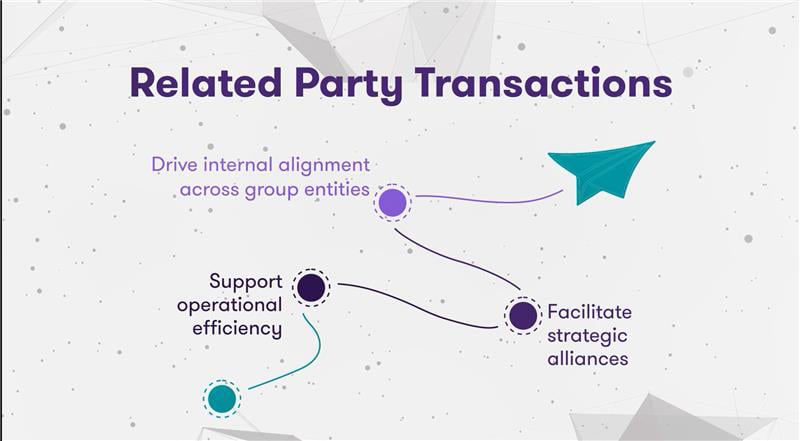Related-party transactions (RPTs) are common in business structures where organisations engage with their group entities, such as holding companies, subsidiaries, associate concerns, joint ventures, or key management personnel, for various operational or financial purposes. While legitimate, these transactions can raise governance concerns if they are not conducted transparently, fairly, and at arm’s length. For example, a royalty or management fee paid by a subsidiary to its parent company without sufficient justification may be perceived as prejudicial to minority shareholders.
The Companies Act, 2013, serves as a regulatory backbone for RPTs, mandating prior board or shareholder approval for specified transactions to ensure they are conducted transparently and in the best interest of all stakeholders.
The Securities and Exchange Board of India (SEBI) proactively takes measures to strengthen the governance framework and oversight regarding RPTs. This includes the introduction of Industry Standards effective from 1 September 2025, which standardises the disclosure requirements for approval of RPTs by an audit committee and/or shareholders. The increased scrutiny by SEBI and extensive disclosure requirements have made it imperative for companies to reconsider their approach to RPT governance, regulatory oversight, and the creation of robust, transparent, and automated approval mechanisms.
At Grant Thornton Bharat, we support the review of RPTs, including documentation and related approval processes, and offer bespoke solutions to help you navigate RPT governance with ease. Our team of seasoned professionals assist companies across various sectors in undertaking RPT reviews, in addition to sharing best practices that help improve RPT governance systems and processes.
Who is a related party?
The concept of a ‘related party’ (RP) is defined across various statutory and regulatory frameworks, including the Companies Act, 2013, Accounting Standard (AS) 18, Indian Accounting Standard (Ind AS) 24, and SEBI (Listing Obligations and Disclosure Requirements) Regulations, 2015 (SEBI Listing Regulations). Each framework outlines specific criteria to determine whether a relationship qualifies as an RP in the context of a company’s financial and operational transactions.
| Companies Act, 2013* | Accounting Standard-18* | IND AS-24* | SEBI Listing Regulations* |
|---|---|---|---|
|
‘Control’ includes:
‘Significant influence’ refers to: Participation in the financial and/or operating policy decisions of an enterprise, but no control over those policies. |
|
|
RPT Governance: From Policy to Practice
As regulatory expectations around Related Party Transactions (RPTs) continue to evolve, finance and compliance leaders are taking on expanded responsibilities in governance, oversight, and reporting. In this context, we conducted an exclusive session designed for CFOs, Company Secretaries, and compliance leaders, focused on building a proactive and resilient RPT governance framework.
What constitutes RP transactions?
The concept of a related party transaction (RPT) is governed by various statutory and regulatory frameworks, including the Companies Act, 2013, Accounting Standard (AS) 18, Indian Accounting Standard (Ind AS) 24, and the SEBI Listing Regulations. These frameworks define RPTs as financial or operational dealings between a company and individuals or entities with existing relationships, such as directors, key managerial personnel, their relatives, or affiliated entities, where influence or control may exist. Such transactions must be conducted transparently and fairly to ensure compliance and protect stakeholder interests.
| Companies Act, 2013* | Accounting Standard-18* | IND AS-24* | SEBI Listing Regulations* |
|---|---|---|---|
|
|
|
A transaction involving a transfer of resources, services, or obligations between:
Regardless of whether a price is charged, a ‘transaction’ with an RP shall be construed to include a single transaction or a group of transactions in a contract. Note: There are certain exempted transactions which shall not be treated RPT and incudes:
|
Key legislation governing RPTs
- The Companies Act, 2013.
- SEBI (Listing Obligations and Disclosure Requirements) Regulations, 2015 (SEBI Listing Regulations).
- Accounting Standard 18 (AS-18) and Indian Accounting Standard (Ind AS) 24 primarily outline the policies and compliance requirements for RPTs.
- The Industry Standards act as a critical enabler of effective RPT governance by providing structured, risk-based disclosure and review frameworks that reinforce the overall integrity of corporate decision-making.
- The Income-Tax Act covers RPT between two domestic RPs to the extent that either of the entities is availing tax. GST and special valuation law lay down requirements for RP supply.
- Robust RPT policies formulated as per regulatory requirements.
Industry Standards Forum (ISF)
To strengthen RPT governance, SEBI has supported the creation of Industry Standards effective from 1 September 2025 - developed by the Industry Standards Forum (ISF), comprising representatives from ASSOCHAM, CII, and FICCI under the aegis of stock exchanges.
These standards mandate minimum disclosures and documentation for audit committee and shareholder review, aiming to improve clarity, consistency, and decision-making around material RPTs. Listed entities must assess their current processes and upgrade them to meet these standards effectively.
Lifecycle of RPT governance

Next steps for listed entities
Training to relevant stakeholders on ISF standards
Revise SOPs and internal control mechanisms
Categorise transactions based on type of disclosure required
Standardise industry disclosures in line with new norms
Ensure proper identification of RPs
Comply with certification and documentation requirements
How Grant Thornton Bharat can support
Our bespoke solutions are designed to simplify RPT governance—covering end-to-end support from detailed reviews of RPTs, documentation, and approval workflows to strategic guidance on industry best practices. Our services include:
Ensuring preparedness for ISF Industry Standards
Assisting with RPT compliances and approval process
Revamping SOPs and processes
Performing arm's length review and validation
Ensuring RPT documentation robustness
Labelling of RPTs to common, transaction based, and material
Regulatory alerts
SEBI circular on industry standard for RPT disclosures
These standards ensure transparent and fair approval processes for RPTs across listed entities.


RPT disclosures: FAQs on applicability of industry standards
The FAQs offer crucial guidance on the applicability of industry standards for RPT disclosures, effective from 1 September 2025.
RPT disclosures: Revised SEBI circular on Industry Standards
The effective date for implementation of the revised Industry Standards has been deferred to 1 September 2025.

References:
* Companies Act, 2013
* AS-18
* IND AS 24
* SEBI Listing Regulations




